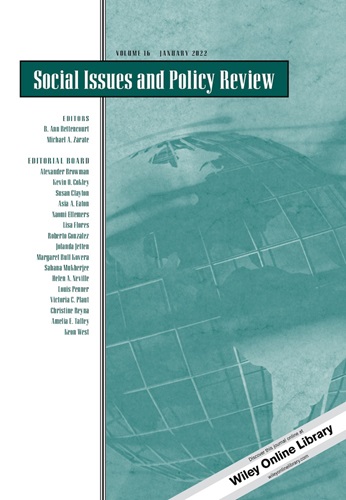公共传播是实施环境政策的工具
IF 5.6
1区 心理学
Q1 PSYCHOLOGY, SOCIAL
引用次数: 36
摘要
气候变化是我们这个时代最大的挑战之一。从长远来看,我们人类必须在短期内改变我们的行为,以减轻气候变化的影响。政策制定者制定环境政策来激励这种行为改变。然而,人们可能无法改变更可持续的做法,破坏环境政策的有效性。公共通讯,例如大众传播媒介运动,可以加强对环境政策的遵守,但它们尚未充分发挥其潜力。在这篇文章中,我建议,如果公共传播者考虑到影响可持续行为的社会和心理过程(通常是违反直觉的),环境传播将更加有效。我提出的研究证据表明,认知偏见(贴现、控制感知、乐观偏见、否认、防御性回避和抗拒)、情绪(恐惧和希望)和期望(关于传播源的意图和其他人的环境行为)对环境公共传播作为促进可持续行为的工具的力量的影响。如果在环境公共传播的设计中忽略了社会和心理过程,信息可能会适得其反,达到与预期相反的效果。为了改善环境沟通,我提出了三个沟通设计建议:保持简单,平衡信息,提供行动视角。本文章由计算机程序翻译,如有差异,请以英文原文为准。
Public Communication as a Tool to Implement Environmental Policies
Climate change is one of the greatest challenges of our times. We humans must change our behavior in the short run to mitigate the effects of climate change in the long run. Policymakers develop environmental policies to motivate this behavioral change. However, people may nonetheless fail to change to more sustainable practices, defeating the effectiveness of environmental policies. Public communications, such as mass media campaigns, can enhance compliance with environmental policies, but they have not yet lived up to their potential. In this contribution, I propose that environmental communication would be more effective if public communicators took account of the (often counterintuitive) social and psychological processes that influence sustainable behaviors. I present research evidence of the impact of cognitive biases (discounting, control perceptions, optimism bias, denial, defensive avoidance, and reactance), emotions (fear and hope), and expectations (about the intentions of the communication source and other people's environmental behaviors) on the power of environmental public communication as a tool to promote sustainable behaviors. If social and psychological processes are neglected in the design of environmental public communications, messages can backfire and achieve the opposite of what was intended. To improve environmental communications, I propose three communication design suggestions: keep it simple, balance the message, and provide an action perspective.
求助全文
通过发布文献求助,成功后即可免费获取论文全文。
去求助
来源期刊

Social Issues and Policy Review
Multiple-
CiteScore
22.20
自引率
1.10%
发文量
9
期刊介绍:
The mission of Social Issues and Policy Review (SIPR) is to provide state of the art and timely theoretical and empirical reviews of topics and programs of research that are directly relevant to understanding and addressing social issues and public policy.Papers will be accessible and relevant to a broad audience and will normally be based on a program of research. Works in SIPR will represent perspectives directly relevant to the psychological study of social issues and public policy. Contributions are expected to be review papers that present a strong scholarly foundation and consider how research and theory can inform social issues and policy or articulate the implication of social issues and public policy for theory and research.
 求助内容:
求助内容: 应助结果提醒方式:
应助结果提醒方式:


